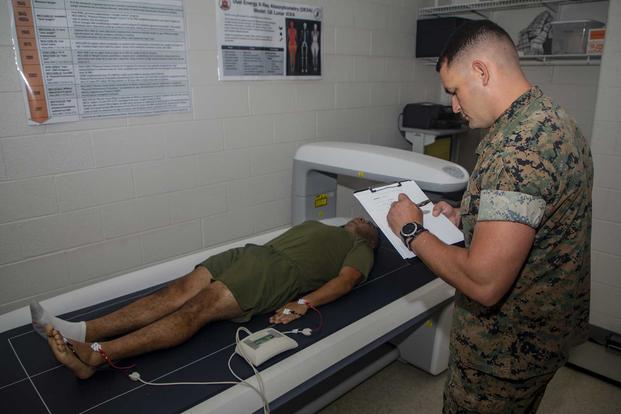The Marine Corps has announced that it is changing the way it determines the body composition of its Marines, becoming the first military branch to move away from the traditional tape test in favor of more accurate methods.
Leaning on new scientific data from "one of the most technologically advanced studies on the topic since the 1980s," the Marine Corps says it will start using X-ray scanners and other equipment to determine the body fat composition of its service members.
In a message released Monday evening, the service said that, starting on the first day of 2023, commanders will no longer formally assign Marines to its body composition program (BCP) -- designed to help overweight troops lose weight -- or separate Marines for failing to lose weight while in the BCP "unless body fat is estimated by dual energy x-ray absorptiometry (DEXA) or bioelectrical impedance analysis (BIA)."
Read Next: Fort Bragg Officials Have Few Answers for More Than 1,000 Soldiers Evacuating Moldy Barracks
Previously, Marines' body composition was determined solely using a tape test that measured a person's neck and waist and compared that value against their height. The Marine Corps says that method would misidentify about 8% of male and female Marines as overweight. Furthermore, there is civilian data that shows that the test has flaws.
The changes come after the completion of a study that the Corps' Training and Education Command did with the United States Army Research Institute of Environmental Medicine on body composition and fitness that involved more than 2,000 Marines. In a statement on the results, the Corps noted that a DEXA scan "is the most accurate means to estimate body fat, lean body mass, and bone density."
"We recognize that a more scientifically advanced method of determining body composition is required before a Marine is assigned to a program that could have career implications," Lt. Gen. Kevin Iiams, head of Training and Education Command, said in the statement.
In addition to adding more accurate assessments of body composition to its fitness tests, the Corps also announced that body fat standards for female Marines will increase by 1% – something that has been a point of concern for years.
"We also recognized that male and female Marines' body composition standards did not similarly compare to performance-related body fat," Iiams explained. "We have updated the maximum percentage allowed for females to reflect what the science told us was an equally-balanced and standardized body composition across the force."
The Marine Corps is not the only branch that has been looking to supplement the traditional tape test with more rigorous and advanced assessments.
The Army has said it is studying some of the same methods that the Corps just announced it would be implementing. In February, Military.com reported that the Army was considering employing DEXA and BIA techniques, among others, in future assessments. However, one concern for the branch has been cost: A DEXA scanner, although considered the most accurate, would cost between $50,000 and $100,000, according to the Army.
Meanwhile, the Air Force ditched its tape test in 2020 but has yet to replace it with a new method. Military.com reported in February that it was considering a different tape measurement approach.
"This study marks a milestone in understanding the health and performance of our Marines," Marine Corps Commandant Gen. David Berger said, before hinting at more changes in the future.
"These are likely not the last changes to come for the body composition program," Iiams said.
"We are a learning organization and will continue to refine these important health and readiness-programs as we collect more data."
-- Konstantin Toropin can be reached at konstantin.toropin@military.com. Follow him on Twitter @ktoropin.
Related: Marines Weigh Alternatives to Dreaded 'Tape Test' Measure of Body Fat












